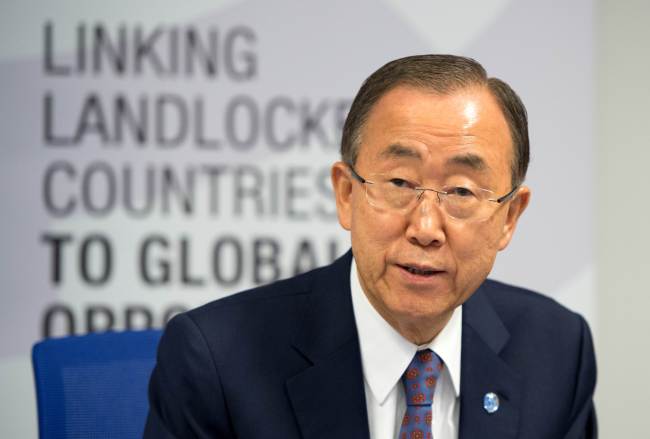U.N. Secretary-General Ban Ki-moon is sending ripples through the country’s political arena without lifting a finger.
Ban has said nothing about what he will do after his term ends, but he was picked as the favorite presidential contender here, with nearly 40 percent of the respondents supporting him in a recent survey.
In comparison, Seoul Mayor Park Won-soon ― another potential favorite ― received 13.5 percent support, while Saenuri Party chairman Rep. Kim Moo-sung was given 4.9 percent support.
Prompted by Ban’s sudden rise as a potential contender, the ruling Saenuri Party took the initiative with the members of its pro-Park Geun-hye faction first linking him to the presidential campaign.
 |
U.N. Secretary-General Ban Ki-moon attends a press conference during the U.N. Conference on Landlocked Developing Countries at the United Nations headquarters in Vienna, Austria, Monday. (AFP-Yonhap) |
At a conference held last month on the possibility of Ban running in the 2017 presidential election, pro-Park lawmakers concluded that the diplomat could be an answer if public opinion was against the ruling party.
The pro-Park faction’s discussions were followed shortly after by claims that Ban was considering joining the main opposition New Politics Alliance for Democracy.
According to Kwon Roh-kap, an NPAD senior adviser and one of the key members of late President Kim Dae-jung’s Donggyo-dong faction, Ban’s associates had recently approached him.
Kwon said that a “very close associate” of Ban had requested he take the U.N. secretary-general into the NPAD.
Kwon also dismissed the possibility that Ban could run on the ticket of the Saenuri Party, claiming that it was made clear to him that Ban had ruled out running as a conservative candidate.
“I can’t comprehend the talk from the ruling party, and when they (Ban’s associates) came, they told me clearly that Ban would not go to the ruling party,” Kwon said.
On the surface, the two sides appear to be using the “Ban Ki-moon card” for similar ends.
By looking to Ban as a presidential contender, the pro-Park faction is considered to be trying to keep Saenuri Party chairman Rep. Kim Moo-sung in check, while the same move made by the nonmainstream members of the NPAD is thought to be aimed at pushing back against the pro-Roh Moo-hyun lawmakers of the party.
Pundits, however, say that the two sides are likely to have very different objectives in raising the possibility of Ban as a presidential candidate. For the pro-Park faction, Ban may simply be a potential candidate who has wide support from conservative voters, while the Donggyo-dong faction may be using Ban to warn the mainstreamers that it will not easily be pushed aside in next year’s party convention.
Although both sides may hope to recruit Ban, professor Shin Yul of Myongji University said that their chances were far from equal.
“Ban is not stupid. No matter how much clout President Park Geun-hye loses (by the next presidential election), he would choose the party with a 40 percent rating, the party backed by the president’s faction,” Shin said.
Saying that Ban has the ability to read the political landscape, Shin added that the U.N. secretary-general would not follow the same path as Rep. Ahn Cheol-soo if he entered local politics.
“Unlike Ahn, Ban has served in Cheong Wa Dae, and as a minister, he has (the ability to make) political judgments.”
By Choi He-suk (
cheesuk@heraldcorp.com)








